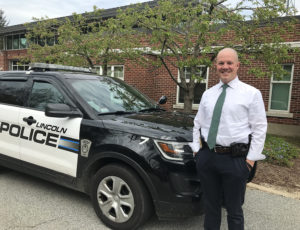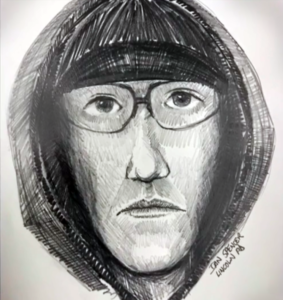By Alice Waugh
Detective Ian Spencer is the Lincoln Police Department’s Juvenile Officer, but sometimes he draws a different kind of duty: creating forensic sketches of crime suspects.
Spencer is a trained police artist who interviews crime victims about what a suspect looked like. The sketch emerges after conversation and continual revisions of his drawing as he goes along to make sure he captured the victim’s visual memory as accurately as possible. His work recently paid off when one of his sketches resulted in the arrest of a suspect in a stabbing in Everett.
After graduating from the fine arts program at Burncoat High School, a magnet school in Worcester, he studied sculpture at the University of Massachusetts in Amherst, a path that wasn’t too surprising given his family background — his sister is a music teacher and his brothers are an artist and a dancer who went to the Juilliard School.
“My dream job was a position in movie special effects, but that clearly did not happen,” Spencer says with a chuckle. When he didn’t get into a computer animation program he was aiming for, he finished his degree at UMass-Lowell and went to Plan B: a career in law enforcement. “Police work was something I always wanted to do — I just didn’t realize it was something I could have done earlier on,” he says.
Shortly after Spencer was hired in Lincoln in 2005, he encountered Concord Police Department inspector Jack Skinner, also a forensic artist, and with then-Police Chief Kevin Mooney’s blessing, he began looking into further training in the field. He eventually graduated from the FBI’s intensive three-week Forensic Facial Imaging Course in Quantico, Va., and is now one of the only FBI-trained forensic artists in New England.
As part of a small network of forensic artists nationwide, Spencer has applied his skills all over the country and trained with artists from as far away as Australia. His work has included creating sketches for the Center for Missing and Exploited Children, using his training an anatomy and age progression to try to visualize what a missing child might look like today.
“If a kid has been missing for years, you can look at photos of the mom and dad at the same age [as the child] and use that to estimate how getting older has changed the missing persons face,” he says. He’s also used some of the same techniques to recreate what an unidentified corpse might have looked like in life.
“Artistic ability is fine, but it’s really the ability to connect with someone who’s gone through a trauma and how quickly we can get on the same page,” said Spencer, noting that many of the people he’s worked with were victims of sexual assault.
The process requires Spencer and the victim to establish a rapport, “letting that person know they’re 100% in control and I’m a resource to them,” he says. “To sit down with someone and ask that person to go back in their mind and think of the worst possible day of their life, sitting in close proximity to another male they’ve never met—that gets really difficult, but sometimes those are the most effective images, “ he says. “In a way you’re revictimizing them, but their memory for this event can be the catalyst for capture, and there’s an empowering component to that.”
Over the years, Spencer has done about 100 police sketches, and perhaps a quarter of them have resulted in identification of a suspect and/or an arrest (though visual identification is not enough in itself), he says.
The sketch work has also broadened Spencer’s reach as a detective. “I’m incredibly fortunate to be able to bring that art component into police work. It’s paid such amazing dividends,” he says. ”That’s 100 cases I never would have gotten a chance to investigate otherwise. It sharpens your ability to talk to people. A pencil and paper can sometimes be as effective than whole team of investigators.”
“Ian is a tremendous resource not only to the Lincoln Police, but other police departments as well. It’s invaluable as an investigator to have that tool available,” said Lincoln Police Chief Kevin Kennedy.
Spencer is currently working toward a master’s degree in criminal justice and hopes to be able to teach forensic sketching in the future. In the meantime, he talks to high school students all over the state about topics such as vaping, drugs and online behavior, but he also tells them about his unusual hybrid career. If a student is interested in more than one field, “I tell them to look at it, examine it, and see if the two or three can be tied in together.”



Great story! Talent well used. I’ve learned that life has a way of taking us where we need to be.
really good story, alice! thank you.
Aren’t we fortunate to have him as part of our police department!
This was fascinating!